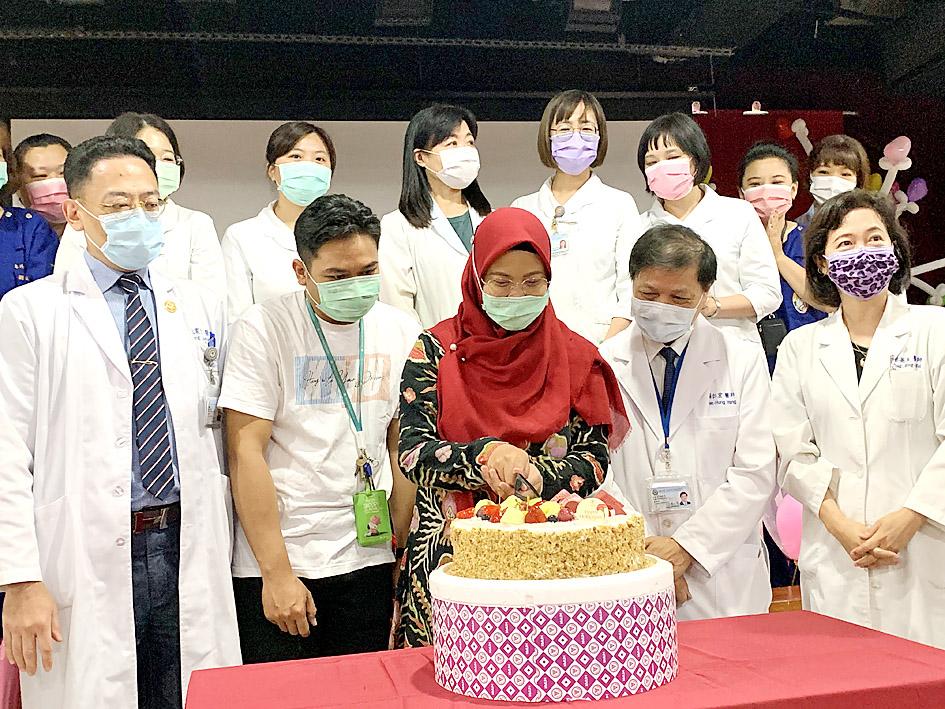The Executive Yuan yesterday unveiled a NT$9.1 billion (US$325.1 million) package of subsidies for parental leave, prenatal screenings and in vitro fertilization (IVF) procedures in a bid to boost the nation’s birthrate.
The parts of the proposal that do not require legislative consent are to be implemented from July 1, Executive Yuan spokesman and Minister Without Portfolio Lo Ping-cheng (羅秉成) told a news conference in Taipei after a regular Cabinet meeting.
Amendments to the Employment Insurance Act (就業保險法) and other regulations would increase the allowance for parental leave from 60 percent of insured salary to 80 percent, he said.

Photo: Fang Chih-hsien, Taipei Times
The increased allowance, which is to cost NT$4.2 billion, would draw funding from sources other than the Labor Insurance Fund to avoid crowding out other benefits, he said.
Amendments to the Act of Gender Equality in Employment (性別工作平等法) would allow spouses to go on concurrent parental leaves with allowances for one to six months, and each household can avail of this leave twice, he said.
Other, shorter-term leaves for childcare would also be permitted under proposed changes, he said.
In addition, workers would be able to apply for unpaid parental leave regardless of the employment status of their spouse and without providing a reason for doing so, he said.
Workers would have to give employers advance notice before taking parental leave to facilitate staffing arrangements at the workplace, he said.
Eligibility for the government’s IVF subsidies would be broadened to include all married couples who cannot conceive if at least one of the spouses is Taiwanese and the woman is under 45 years of age, Ministry of Health and Welfare Deputy Minister Shih Chung-liang (石崇良) said.
Income restrictions were removed after the program reported that only 52 low and medium-income couples enrolled for IVF subsidies, which produced only seven births over the past six years, he said.
Higher-income households are to receive a subsidy of NT$100,000 for their first IVF procedure and NT$60,000 for each one after that, he said.
As before, low and medium-low income households are to receive a subsidy of up to NT$150,000 per procedure.
Households in which the wife is younger than 40 years old can claim subsidies for six IVF procedures per conception, while households in which the wife is aged 40 to 45 can claim three.
Officials estimate that the expanded subsidies would benefit between 23,000 and 28,000 households, and that the program would cost up to NT$3.2 billion.
Free prenatal screenings would be increased from 10 to 14 for each pregnancy, while coverage would be broadened to include screenings for gestational diabetes and anemia, and two ultrasound tests.
Subsidies for the screenings would also be raised to improve the health of pregnant women, reduce infant mortality rate and encourage people to go into obstetrics.
The revised prenatal screening subsidies should benefit about 160,000 households and cost about NT$1.25 billion.

‘DENIAL DEFENSE’: The US would increase its military presence with uncrewed ships, and submarines, while boosting defense in the Indo-Pacific, a Pete Hegseth memo said The US is reorienting its military strategy to focus primarily on deterring a potential Chinese invasion of Taiwan, a memo signed by US Secretary of Defense Pete Hegseth showed. The memo also called on Taiwan to increase its defense spending. The document, known as the “Interim National Defense Strategic Guidance,” was distributed this month and detailed the national defense plans of US President Donald Trump’s administration, an article in the Washington Post said on Saturday. It outlines how the US can prepare for a potential war with China and defend itself from threats in the “near abroad,” including Greenland and the Panama

The High Prosecutors’ Office yesterday withdrew an appeal against the acquittal of a former bank manager 22 years after his death, marking Taiwan’s first instance of prosecutors rendering posthumous justice to a wrongfully convicted defendant. Chu Ching-en (諸慶恩) — formerly a manager at the Taipei branch of BNP Paribas — was in 1999 accused by Weng Mao-chung (翁茂鍾), then-president of Chia Her Industrial Co, of forging a request for a fixed deposit of US$10 million by I-Hwa Industrial Co, a subsidiary of Chia Her, which was used as collateral. Chu was ruled not guilty in the first trial, but was found guilty

A wild live dugong was found in Taiwan for the first time in 88 years, after it was accidentally caught by a fisher’s net on Tuesday in Yilan County’s Fenniaolin (粉鳥林). This is the first sighting of the species in Taiwan since 1937, having already been considered “extinct” in the country and considered as “vulnerable” by the International Union for Conservation of Nature. A fisher surnamed Chen (陳) went to Fenniaolin to collect the fish in his netting, but instead caught a 3m long, 500kg dugong. The fisher released the animal back into the wild, not realizing it was an endangered species at

DEADLOCK: As the commission is unable to forum a quorum to review license renewal applications, the channel operators are not at fault and can air past their license date The National Communications Commission (NCC) yesterday said that the Public Television Service (PTS) and 36 other television and radio broadcasters could continue airing, despite the commission’s inability to meet a quorum to review their license renewal applications. The licenses of PTS and the other channels are set to expire between this month and June. The National Communications Commission Organization Act (國家通訊傳播委員會組織法) stipulates that the commission must meet the mandated quorum of four to hold a valid meeting. The seven-member commission currently has only three commissioners. “We have informed the channel operators of the progress we have made in reviewing their license renewal applications, and